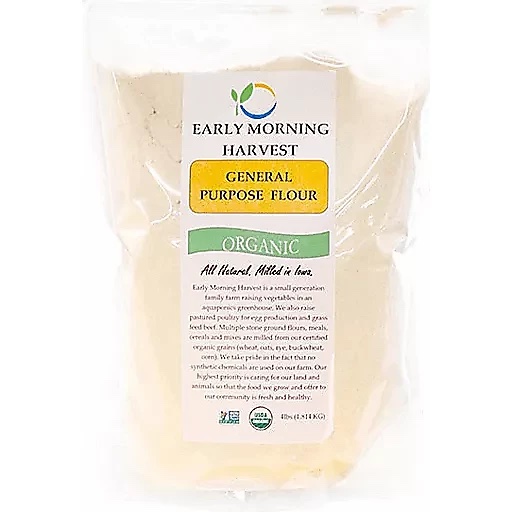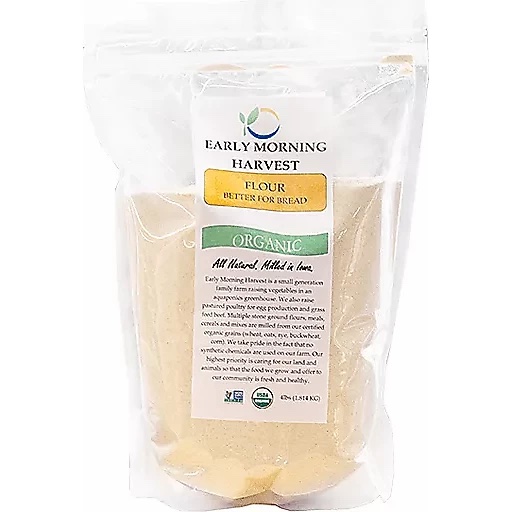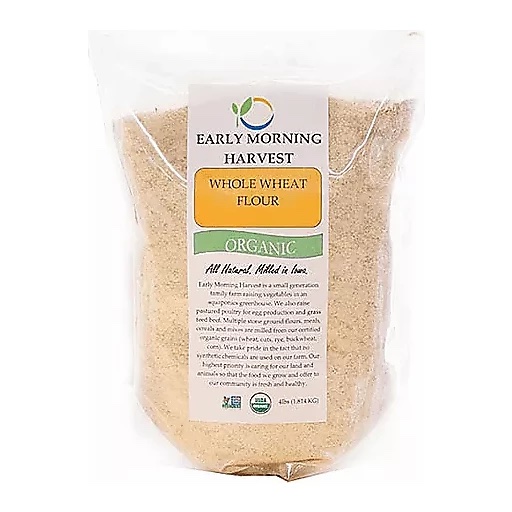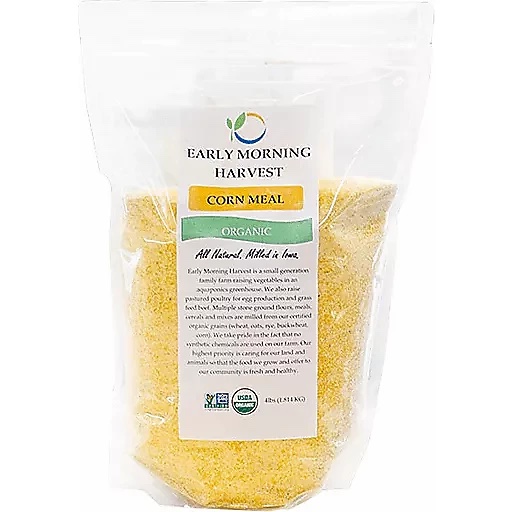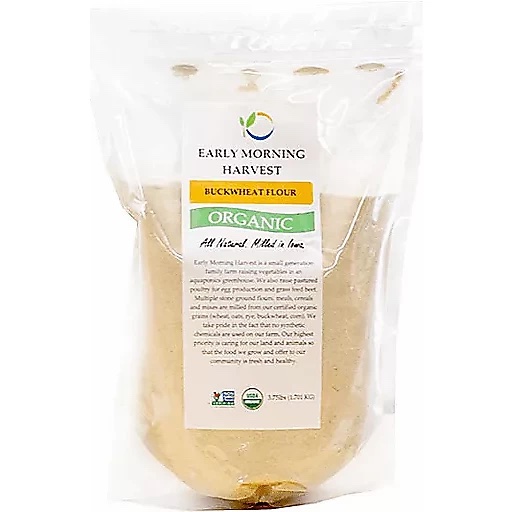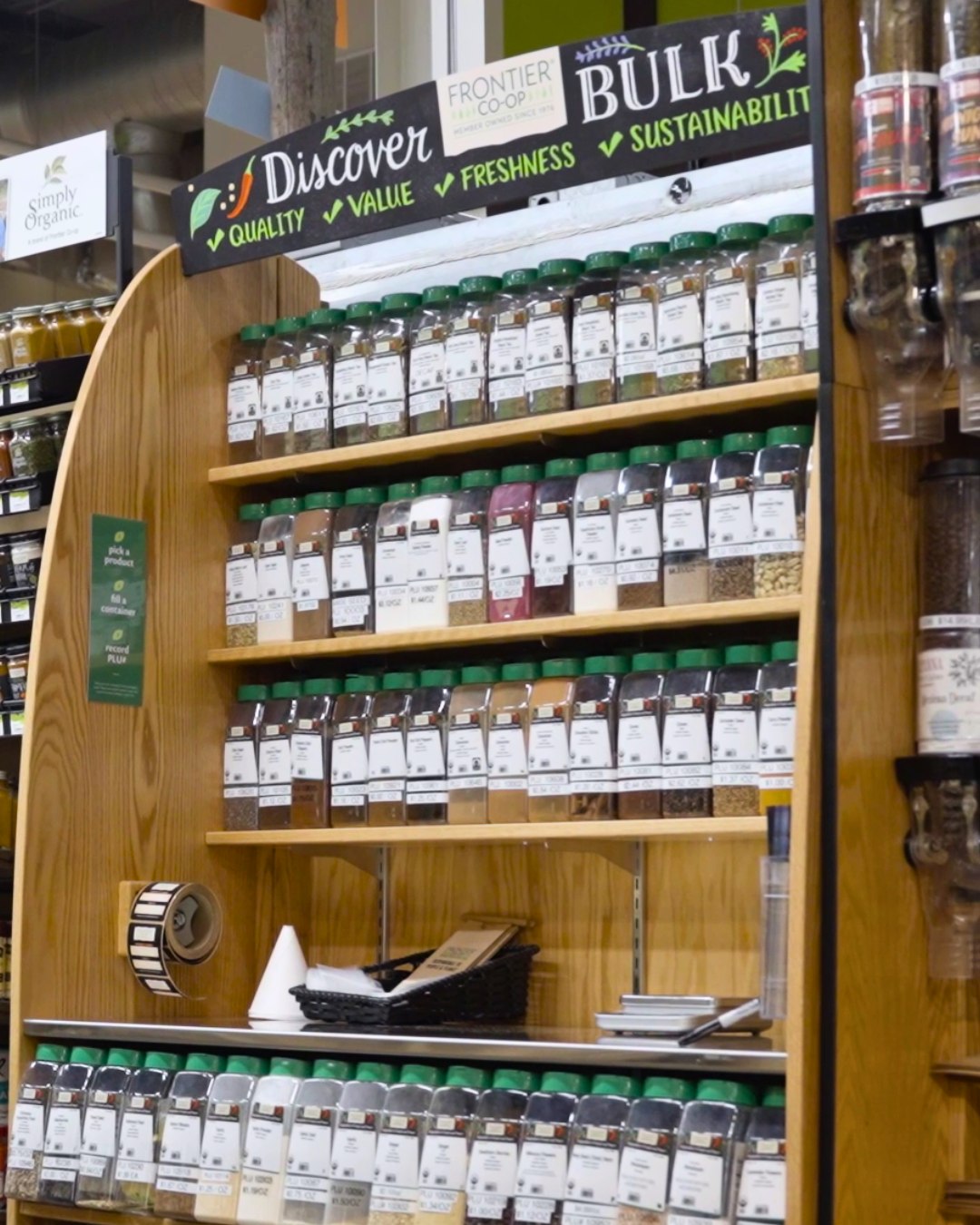Dipping through rolling hills on gravel, we pull up along happy pastured cows to a cluster of barns for exactly our kind of reception:
“You realize this is a farm – a working farm, right?” Rhonda welcomes us to potential mud, as it’s rained recently.

Rhonda’s husband Earl grew up here, a sixty-seven-year-old with a boyish grin and a twinkle in his eye: "The farm has been in our family’s operation since 1948, when my parents lived here,” Earl tells us. “Now it’s actually my son Jeff ’s farm. And he works even harder than we do.”
Jason Peters, New Pioneer Food Co-op’s Kitchen Lead, recalls our first deliveries of Early Morning Harvest flour for our bakery, not long ago at all:
“Earl would drive down in his pickup truck with the bed full of bags of flour.”
Since then, Earl’s stone-milled organic Iowa grains have made it into so many of New Pi’s breads, our ready-to-eat foods, and our shelves, that Jason’s pleased to report:
“Now we’re ordering so much it has to come by semi.”
We meet the heart of the milling operation, the stone mill: “We started out with a 4-incher,” Earl grins. “This one is 20 inches.” Later we find out, a 20-inch stone mill will set you back $17,000. And the sifter is close to $10,000. Plus a perfectly spotless facility set up with two levels, just for the purpose, to boot? This is no po-dunk operation by any means.

Working by Hand
Earl starts up the mill: “The way this works is I turn it on…” it rumbles to life. “Then I calibrate it…” he dials up the grind and carefully adjusts. “Hear the stones kiss in there?”
“It’s the touch of making the stones kiss that teaches you how to mill flour. You have to learn by doing,” Earl explains. Paula – who fills the orders, cleans around Earl as he works to keep the place spotless (avoiding a sticky wheat paste situation), and remembers the days of the 4-inch-grindstone – laughs: “Think how long it took this old man to learn all this!”

Paula’s filling up 4 lb. bags, and then 25 and 50 lb. bags while we ooh and ahh at the beautiful natural tones of each grain.
“It’s all done by hand,” she comments, as she handfills a bag and marks it with a person’s name (they have on-farm pickup too).
Everything they do is milled by hand, filled by hand, scaled by hand, and sealed or run through a big sewing machine by hand too.
“We went with a grinding mill rather than a rolling mill or a hammer mill,” Earl tells us, “because the temperature of the flour stays much lower. We try to keep it at 85°F and shut it down if it gets too hot, otherwise the quality of the flour goes down.”
So many of our common American sayings have farming roots (it makes sense – back in the day, most of us would have been farmers): “When I was a kid,” Earl recalls,
“three miles up there was a flat stone mill on the river, and that’s where I learned the term ‘keep your nose to the grindstone.’
They adjusted that horizontal stone down until they could smell the flour burning, and then they backed it off.”
The phrase is about focus, and is still relevant:
“If I keep [the grain on the stone] under 100°F, the flour quality will be a lot better.”

Whole Grain Nutrition
All this adds up to Early Morning Harvest’s all purpose flour being very different from the generic white bags of flour we’re used to:
“The commercial [flour producers] take the germ out of the flour because they can get more money for the germ – they can sell wheat germ and they can sell vitamin E.”
But then the product is nutritionally depleted:
“So they add calcium and vitamin D, so it’s ‘enriched.’ But why’d they take it out in the first place?”
Nothing like a good rhetorical question: money talks and answers that one. Early Morning Harvest leaves the grain intact – germ included.
“We could have called the business Whole Grain Milling,” Earl nods. While commercial producers remove the healthy germ (read Michael Pollan’s Cooked for more on this manufacturing twist),
“We don’t have the facility – or the desire – to do that,” Earl says with confidence. Early Morning Harvest’s grains truly are more wholesome and more nutritious.
Their process doesn’t start and stop with milling, however:
“We try to grow everything: this year we have 500 organic acres of corn, 200 rye, 40 hard red spring wheat, 20 hard red winter wheat, and we’ll have 100 buckwheat later,” Earl tallies. “When we harvest, we have it tested. We have to keep the quality up.” If it’s not up to their quality standards, “We call up our neighbors, buy their grain, and sell ours.”
Grain may be the big draw, but they’re bringing diversity back to the farm. When Jeff came home after his second tour in Iraq, he wanted to grow vegetables with no weeds, and had studied aquaponics in Iraq.
They now have a bountiful greenhouse, with integrated tilapia production, and no inch is wasted: edibles spring from every nook in the greenhouse.
They intersperse marigolds for pest control, as I’ve also seen at Maharishi Organic Greenhouse: “They help,” Earl says. “Mother nature is great.”
Earl has a good story about their cattle too:
“Cows will eat [genetically modified] Bt corn if it’s all there is, but when my cows got out a mile away, they walked through a mile of GMO corn to get to my [organic corn]. You tell me they’re not smart!”
Manifesting Dreams
Between their aquaponics, grains, cereal mixes, farm store, chickens, cows, and pigs, they have a lot going on. “We just tell our [staff], if you want to experiment, you experiment. We had a girl who wanted to learn orcharding, so now we have an orchard!” It’s a bit baffling, really. “One of our problems is we keep thinking,” Earl smiles. “You get a good night’s sleep and it just comes to you.”
Want a good night’s sleep? Fill your breadbox with New Pi’s Early Morning Harvest loaves and your pantry with Earl’s organic grains and rest easy, knowing they’re the healthiest around and you’re supporting a wholesome, forward-thinking Iowa family farm. Earl knows what a difference it makes:
"You guys help the business grow – your business is important to us.”





